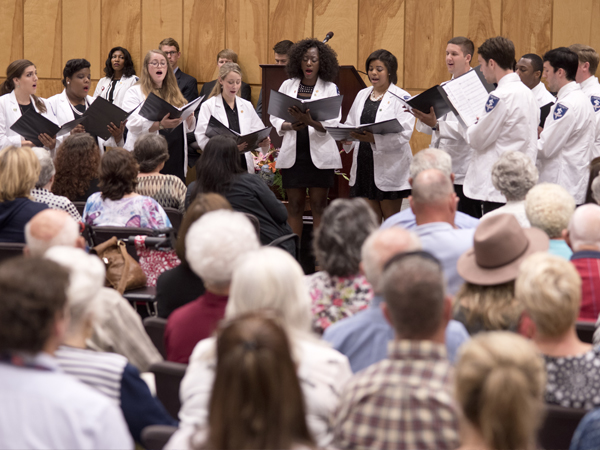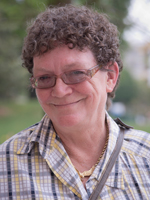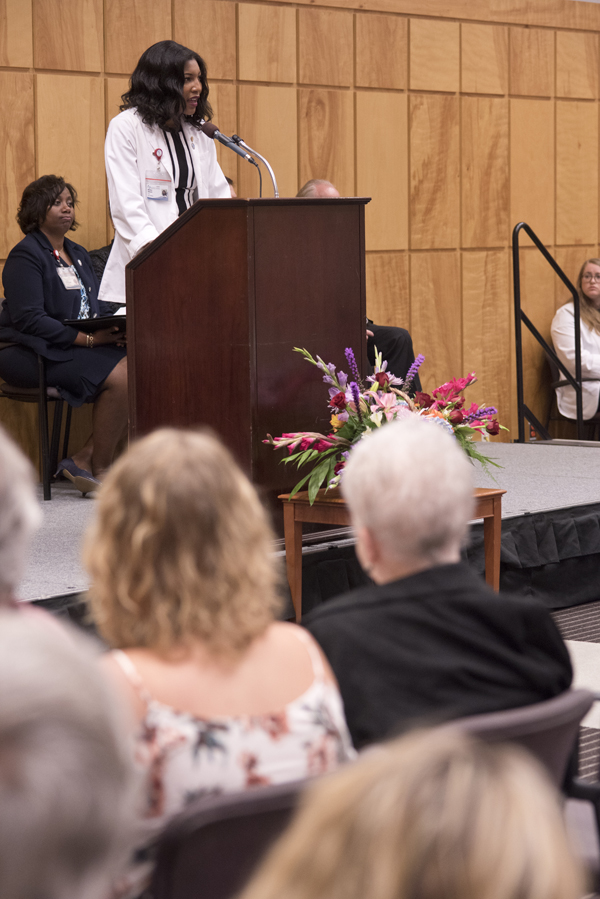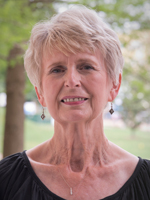Observance honors students’ 'first patients'

Published in News Stories on April 28, 2016
On Wednesday, Karen Gorline drove some 175 miles just to hear someone speak her brother's name.
Stephen Franklin Gorline was 46 when he died last August, one day after his birthday, a man remembered by his family for his independence and wit - and, now, for donating his body to science.
He and more than 260 other anatomical donors were honored in a packed conference room on the UMMC campus, as several hundred relatives, friends, faculty and students listened to their names being read off by Dr. Allan Sinning, professor of neurobiology and anatomical sciences and director of the Body Donation Program.
The donated bodies will be used to provide an education like no other to medical, dental and health related professions students at UMMC.
“My little brother thought it just needed to be done,” Karen Gorline said. “He wanted a way to help other people even after he was gone. And this ceremony today, I believe, can give family members some closure.”

Gorline
This was the 17th annual Ceremony of Thanksgiving, held each year to allow students and faculty members to express their gratitude to the relatives the donors left behind.
“We recognize that this decision is not an easy one for them,” said Dr. Loretta Jackson-Williams, vice dean for medical education in the School of Medicine.
The program, held in the Norman C. Nelson Student Union, featured a tribute from members of Vocalis, a choir made of up of first-year medical students, whose acapella performance included “Sing Me to Heaven," "The Road Home" and "Precious Lord, Take My Hand."
First-year students Ferris McGuire, occupational therapy; Garrett Wallace, physical therapy; Andrew Morgan, dentistry; and Michelle Wheeler, medicine, spoke in turn to Wednesday's gathering, describing the impact of these gifts - their “first patients."

M1 Michelle Wheeler spoke to the donor families and friends during the ceremony.
“There are few people who can say they touched a heart and a life after death,” Wheeler said. “I hope it will bring you solace to know they live on through us.”
In the schools of medicine, dentistry and health related professions, students dissect bodies to better learn the complex systems of the human anatomy - in a profound way that isn't possible through textbooks or any other method, said Dr. Michael Lehman, professor and chair of neurobiology and anatomical sciences.
In this way, the donors become teachers and “honorary professors,” Lehman said.
That description resonates with Beverly Brooks, an administrative assistant in his department; she works with 200-300 donors and their families every year. “Everybody I speak to just wants to help; they want to contribute even after their death,” she said.
“I've never seen so many folks from so many different walks of life - rich to poor, educated to uneducated. It's amazing.
“I didn't know this program existed until I started working in it about three years ago. Now I have given a lot of serious thought about donating my body. The generosity of the people who give is the reason a lot of us have stayed alive.”

Pace
Mary Martha Pace of Brandon, whose husband Casey is an anatomical donor, said afterward that the Ceremony of Thanksgiving had been “moving” and “very reverent.”
Casey Pace, an attorney, had been a volunteer youth soccer coach for 20 years, mentoring his own children as well, she said.
“When the donors were called “teachers” today I thought, 'how appropriate for Casey.' It would be so important to him that his teaching and coaching are still going on.
“There were parts of the ceremony that touched my heart.”
-----
Anyone who is 18 years of age or older and of sound mind may give his or her body. For more information, visit /Education/Schools/Medicine/Basic_Science/Neurobiology/Body_Donation_Program/How_to_Register_in_the_Body_Donation_Program.aspx.


